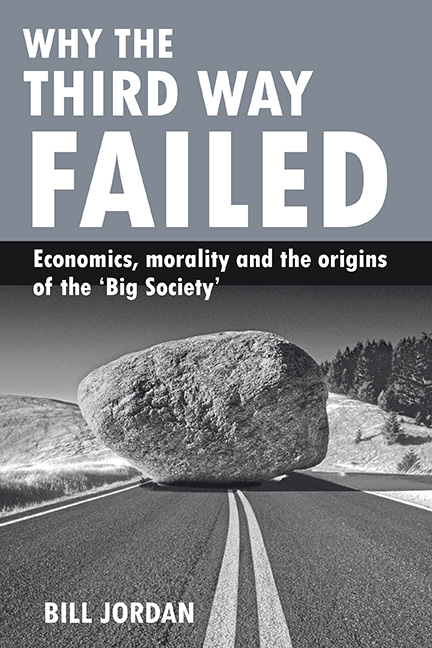six - In search of a moral compass
Published online by Cambridge University Press: 01 September 2022
Summary
In the previous chapter I argued that the Third Way misunderstood the nature of moral regulation in social life, and underestimated its scope. But it could be countered that this was not so much a failure of the Third Way as a problem for all large, diverse, modern societies. After all, Third Way theorists and politicians emphasised the importance of ‘community’ and ‘responsibility’; they also tried to find a basis for political life in human rights and moral values. It is in the link between the everyday world of social relationships, and the more abstract and institutional sphere of general principles, that the problem lies – and this is not only a difficulty for the Third Way.
The problem of this link can be recognised, whether starting with rules for an ideal set of arrangements for human societies or with the specifics of relations between interdependent members. In the former approach, as we have seen, moral regulation relies on an unrealistic version of individual choice by atomistic agents who lack a context for their decisions; in the latter, people share experiences, interpretations and beliefs, but there seems to be no way of judging whether their interactions give rise to right standards or a ‘good society’.
At the time when the ideas which made up the Third Way were being developed (the early 1990s), these dilemmas were being disputed between followers of the liberal tradition of John Rawls (1971), along with the libertarian tradition of Robert Nozick (1974), and those who had challenged them in the name of ‘communitarianism’ (MacIntyre, 1981; Sandel, 1982; Walzer, 1983; Taylor, 1989). As well as trying to bridge the left and the right in politics, the Third Way was attempting to reconcile liberalism and communitarianism in moral and political thought.
While basing its approach on the moral sovereignty, autonomy and choice of individuals, the Third Way claimed to balance rights with responsibilities, and modernisation with concern about ‘family life, crime and the decay of community’ (Giddens, 2001, p 4). This acknowledged a debt to communitarian thinking, especially the socially conservative version of Etzioni (1994), blaming the narrow focus on market economics for social disintegration in the 1980s.
- Type
- Chapter
- Information
- Why the Third Way FailedEconomics, Morality and the Origins of the 'Big Society', pp. 129 - 148Publisher: Bristol University PressPrint publication year: 2010



